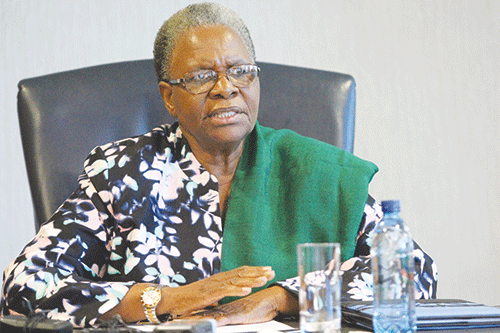Namibia has welcomed the International Court of Justice (ICJ)’s ruling that Israel must immediately take steps to prevent acts of genocide in Gaza, but international relations minister Netumbo Nandi-Ndaitwah is disappointed that the court failed to order a total ceasefire in its ruling.
In its verdict last Friday, the ICJ ordered Israel to implement six
interim measures, including preventing genocide in Gaza, ensuring that its forces no longer commit any acts of genocide, and preventing and punishing any incitement to genocide.
Israel was also ordered to allow humanitarian aid to enter Gaza, prevent the destruction and ensure the preservation of evidence related to the alleged genocide, and submit a report to the ICJ on all steps taken in implementing the order within a month.
With Friday’s ruling, the court underlined its deliberations on South Africa’s genocide case against Israel, for which it heard submissions earlier this month.
South Africa has described Israel’s actions in the Gaza Strip as genocide, but Israel has rejected the allegation, claiming that its activities in Gaza stem from “self-defence”, and are necessary to root out Hamas.
Disappointed
Reacting to Friday’s ruling, Nandi-Ndaitwah, who is also Namibia’s deputy prime minister, said the country has welcomed the ICJ’s ruling.
However, Namibia is somewhat disappointed, as it was expecting stringent measures such as a full ceasefire, as that is the only way to secure the rights and basic humanitarian needs of Palestinians.
“Namibia welcomes the provisional measures ordered, and strongly urges Israel to comply with the legally-binding order of the court. Namibia notes, with regret, that the ICJ has not ordered Israel to halt its military operations in Gaza. As a state that subscribes to the rule of international law, Namibia respects the ruling of the ICJ, but deems it a missed opportunity by the principal judicial organ of the United Nations to contribute towards international efforts aimed at ensuring that Israel immediately ceases with its deliberate actions of indiscriminately killing and maiming innocent Palestinian civilians,” said the minister.
Total ceasefire
Nandi-Ndaitwah observed that Namibia will remain unwavering in its call for a full ceasefire in the Gaza Strip, and will mobilise the international community to ensure that the provisional measures ordered by the ICJ are fully implemented.
“In the face of the ongoing unprecedented carnage in Gaza, disproportionately affecting women and children – more than 26 000 Palestinians have been killed since 07 October 2023 – Namibia reiterates the imperative call for an immediate and permanent ceasefire in Gaza
to avoid the inflicting of further harm and suffering on the Palestinian people of Gaza.”
She added: “The Republic of Namibia will not relent in her efforts to ensure the cessation of hostilities, and aims to ensure respect for the human rights of the Palestinian people, including their legitimate right to self-determination.”
Nandi-Ndaitwah’s South African counterpart, international relations minister Naledi Pandor, likewise indicated to that country’s media that she hopes that Israel will fully implement the provisional measures ordered by the ICJ.
She said the fact that the ICJ has ordered Israel to table monthly reports on the implementation of the order shows they will use this to monitor the situation.
“The fact that the monthly report has been ordered is very significant. It’s clear that the court does say there is circumstantial evidence genocidal acts are committed,” Pandor continued.
How the ruling will be enforced
As members of the United Nations, both South Africa and Israel are bound by the court’s rulings, and cannot appeal a decision. However, the ICJ itself does not have any mechanism to enforce its orders. South Africa, or other nations, could also go to the UN Security Council (UNSC), where member states would be asked to vote to require Israel to abide by the emergency measures ordered by the ICJ.
On previous occasions since the war on Gaza began, the US had used its power of veto to block resolutions calling for a ceasefire and for accountability of its close ally, Israel.
However, experts say Washington’s veto of an ICJ-approved decision could damage and undermine US president Joe Biden’s calls for others – including rivals like China and Russia – to uphold the international rules-based order.
What happens next
at the ICJ?
Friday’s verdict was just an interim ruling to address the emergency measures requested by South Africa. Israel is required to submit its report on the actions it is taking to fulfill the above emergency orders by 26 February – one month from Friday’s ruling. South Africa will then be given the chance to respond to this report.
The court will assess the report and additional information on Gaza’s on-ground realities. It could be concluded that Israel is not abiding by the first provisions, and is imposing new ones.
The court will then also move forward with additional hearings and deliberations on the evidence presented to the court earlier this month by South Africa supporting its accusations against Israel, and Israel’s defence.
The judges will individually evaluate South Africa’s key claims in relation to the genocide in Gaza, and the court’s eventual ruling will be determined by a majority.
The court said its decision to move forward with the case was based on its conclusion that South Africa’s evidence alleging genocide by Israel could not be ruled out prima facie.
– ohembapu@nepc.com.na


